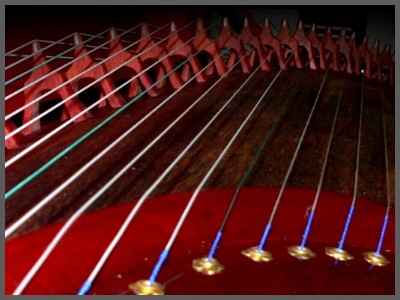Preface
>Articles<
Instruments
Musicians
Books + CDs
Links
_______________________

|
Playing Guzheng
written by
Ingo
Stoevesandt
 “Drowning
in sound” is a main kind of feeling while playing the Guzheng. The deep
and powerful bass, the charming sound of the plucked
high strings and the endurance of the chords are hypnotizing the player
as well as the listener. Compared to other zithers of Asia, the Guzheng
overwhelmes most of all with its powerfull sound. The big size of the
instrument (about 1.60 meter long) does not only give a good
resonance, it also amplifies each touch, scratch or unwanted slide on
the strings and keeps every sound under a long sustain.
“Drowning
in sound” is a main kind of feeling while playing the Guzheng. The deep
and powerful bass, the charming sound of the plucked
high strings and the endurance of the chords are hypnotizing the player
as well as the listener. Compared to other zithers of Asia, the Guzheng
overwhelmes most of all with its powerfull sound. The big size of the
instrument (about 1.60 meter long) does not only give a good
resonance, it also amplifies each touch, scratch or unwanted slide on
the strings and keeps every sound under a long sustain.
Tuning
There
are
many ways to tune the Guzheng,
but I never managed to change the
position of the pyramids while playing a piece - they are holding the
chord and are to much fixed to be moved within a second. This
is
why
the pyramids are just moved for fine tuning purpose before playing, the
main tuning is
made with a tuning key.
The most
easy way to tune the Guzheng is by using the simple pentatonic scale:
DO
- RE -
FA - SOL - LA
This
is the
best and most common tuning for all improvisations.
Fingerpieces
Like
playing the PiPa,
most
Chinese players use 3 plectron as elongated
fingernails for playing, which are made of plastic today and are fixed
to the fingertip with some tape. But even without the plecs, the pure
finger might already be enough to discover the many sounds of the
Guzheng.
Improvisation
In
the
pentatonic scale each tone can be the basic tone for bidirectional
scales. This is why it can be important to play an ostinato of one
single tone or just simply select one tone to be the
“base”
to which your melodies always come back.
Pluck the
strings with your right thumb, index and middle finger. The left hand
can press down the plucked string on the other side of the pyramid
thus changing the pitch or creating a vibrato. It can also try to find
the Flagolet tone for the plucked chord.
The
long
sustain and reverb of the Guzheng also invites to make improvisations
in “wet” sound. You can scratch the chords with
your
fingernails or drum with fingers and palm on the body of the Guzheng.
Some players also tried to play the chords with a bow -
the multiple
and powerful sounds of the Guzheng will keep the player satisfied for
hours!
Please check the Links and Musicians for scores, tips and
partitures for Guzheng players!
|



